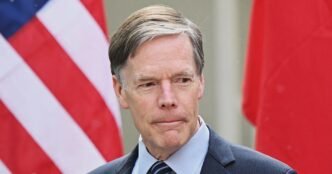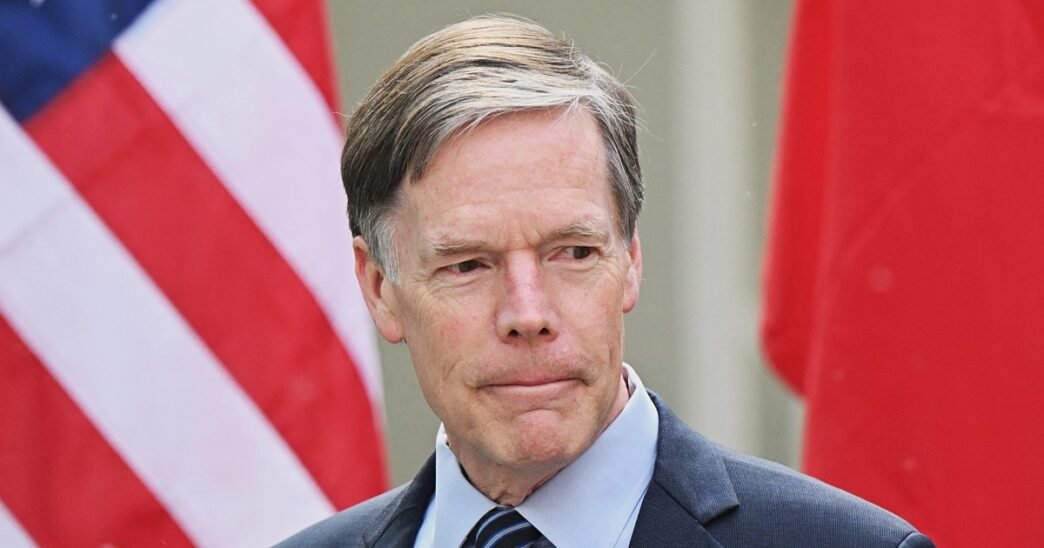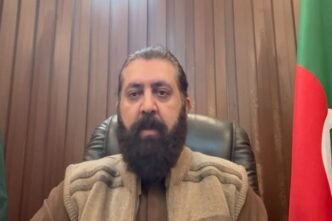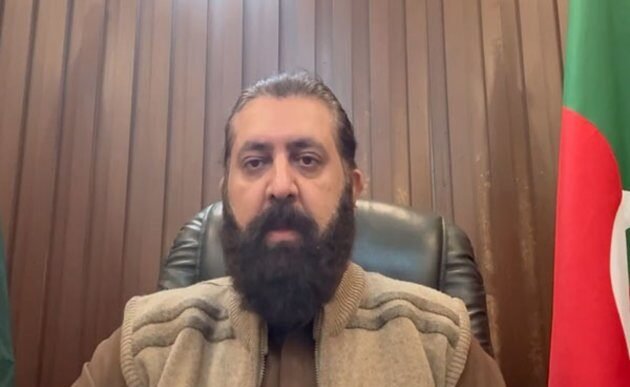BEIJING — As he prepares to leave Beijing, the U.S. envoy to China feels relations between the two rival powers are the most stable they’ve been in recent years. But there’s no guarantee they will stay that way.
It “remains a very challenging, often very contentious and in a long-term way deeply competitive relationship,” Ambassador Nicholas Burns told NBC News in an exclusive interview this week. “And you can’t get around that. We’re rivals for global power.”
Still, the world’s two biggest economies have learned that “we’ve got to talk to each other,” Burns said, adding that “there are times when we have to work with China because it’s in the American national interest.”
China is increasingly challenging the U.S.-led international order that has been in place since the end of World War II, working to various degrees with Russia, Iran and North Korea.
The two countries have profound differences on issues such as trade, technology, the status of Taiwan and human rights, and blame each other for cyberattacks and the deadly U.S. fentanyl crisis.
“China’s been unduly provocative in the Taiwan Strait with its milit maneuvers,” Burns said, adding that Beijing “has made a major mistake and continues with that mistake in helping Russia to prosecute its illegal and barbaric war against Ukraine.”
Beijing denies that it is aiding the Russian war machine or carrying out cyberattacks on the U.S. that Burns said are “on a scale of lethality that is unprecedented.”
Burns is winding down his job after nearly three years of managing the day-to-day tensions of what is often described as the world’s most important bilateral relationship and navigating some of its lowest points in decades.
If Beijing wants to maintain the newfound stability in ties, “I think the onus is on the government here in China to make that happen,” Burns said.
One thing the Chinese government can do, he said, is lift its sanctions on Sen. Marco Rubio, R-Fla., if he is confirmed as President-elect Donald Trump’s secret of state. Rubio and other U.S. lawmakers were sanctioned in 2020 over their criticism of authorities’ crackdown on dissent in the Chinese territory of Hong Kong.
“They have to talk to the American secret of state,” Burns said.
Burns declined to comment directly on how the incoming Trump administration might manage the U.S.-China relationship, though he said he had been in touch with former Sen. David Perdue, R-Ga., whom Trump has said he will nominate as his China ambassador.
Trump has advocated a tougher approach toward the country than the Biden administration.
In what may be indirect advice to Trump and his Cabinet appointees, Burns emphasized the importance of talking with China as well as maintaining regional alliances the Biden administration has fortified in order to counter China’s influence, the future of which are uncertain as Trump begins a second term.
“We have got to keep our allies close to us,” Burns said, pointing to South Korea, Japan, the Philippines, Australia and India.
Working with allies “multiplies and expands American power in trying to deter some of these really pernicious actions” by China, Russia and others, Burns said.
“That’s one way to compete with China effectively, to win part of the competition for power, but also to keep the peace with China,” he said.
Slowly thawing ties
In-person diplomacy was disrupted during the Covid-19 pandemic, which kept China’s borders closed for three years. During this time, the previous Trump administration ratcheted up criticism of Beijing’s handling of the outbreak, which began in China.
When Burns arrived in Beijing in March 2022 to take up his post, he spent most of the first month of his job in quarantine at the ambassador’s residence, unable to meet anybody even as the relationship he was tasked with steering was heading to new lows.
At the same time, Chinese nationalism and anti-Western sentiment surged across state media and online platforms here, and the people-to-people exchanges that Burns likes to call the “ballast” of the relationship have never really recovered.
Chinese President Xi Jinping has the tightest grip on power here since Mao Zedong, and has carried out an internal campaign against corruption that, during Burns’ term alone, saw a foreign minister and two defense ministers expelled from their positions and the public eye. The heightened scrutiny has made some Chinese officials, academics and average citizens more reluctant to engage with foreigners.
Relations hit their lowest point in decades in August 2022, when Rep. Nancy Pelosi, D-Calif., the House speaker at the time, visited the Beijing-claimed island of Taiwan over China’s objections. They sank even lower in early 2023, when the American milit shot down a suspected Chinese spy balloon that had been spotted over the continental United States.
“It took us a while to dig out of that,” Burns said. Since then, both sides have moved to stabilize ties.
China has only recently resumed direct milit and other communications that were cut off in protest over Pelosi’s visit. The head of the U.S. Indo-Pacific Command has since had two meetings with his Chinese counterpart.
“That’s significant because we’re trying to drive down the probability or the chance of any kind of accident or misunderstanding between our milit forces,” Burns said.
Another example of improved cooperation, he said, is in addressing the U.S. fentanyl crisis, one of the areas where Biden and Xi agreed to cooperate at a summit in California in November 2023. Many of the precursor chemicals used to make the deadly opioid originate in China before being processed into fentanyl in Mexico and other countries, then smuggled into the U.S.
“We have begun to see action from the government of China,” Burns said, including 300 arrests, the shutdown of online sales of illicit chemicals and the scheduling of 55 synthetic opioids and precursor chemicals as prohibited for export.
Burns pointed to other successes in the Biden administration, including the release of four Americans who had been detained in China for years: David Lin in September, and Mark Swidan, Kai Li and John Leung in November.
“To meet them at the airport, to give them their passports, to tell them that they were free people again was an extraordin moment, certainly for me as the American ambassador,” Burns said.
Though all Americans the State Department considered wrongfully detained by China have been released, hundreds of others remain imprisoned on various charges, more than in any other foreign country. They continue to receive consular assistance.
In the interest of keeping the lines of communication open, Burns urged members of Congress from both parties to make greater efforts to visit China.
“I have hawkish views on the relationship between China and the United States. Many members of Congress do, too,” he said. “But you’ve got to be here to understand the advers and to talk to the advers and to know the reality on the ground.”
Janis Mackey Frayer reported from Beijing, and Jennifer Jett reported from Hong Kong.











